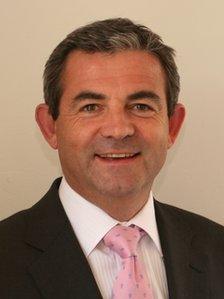Army reservists: From the office to Iraq and back
- Published
Major John Ingledew: "We don't chase Russians across Salisbury Plain with outdated kit anymore"
Army reservists get, in some ways, the worst of both worlds.
As part-time soldiers they can fight - and die - alongside comrades from the regular Army.
But unlike regulars, when their tours of duty end they go straight back to civilian life.
"I was in the desert on the Thursday and was back to work by Sunday," said reservist Kevin Hurley, speaking about his return from Iraq in 2003.
All soldiers now get 24 hours of "decompression" after active service, but many reservists then return to their civilian jobs within days.
Regular soldiers go back to base in the UK, before usually being allowed on leave.
But Mr Hurley said it is civilian employment, not Army life, which poses the biggest problem for reservists.
He said many are overlooked for jobs or promotions because businesses do not want workers who can be called away on military service.
Mr Hurley, who has been a reservist for 43 years and is also Surrey's Police and Crime Commissioner, said he had seen "many cases of discrimination" and had once been told openly he was refused a senior job because he was in the Territorial Army (TA).
"Businesses have to be forced not to discriminate against reservists in the same way they were forced not to discriminate against young women who could get pregnant," he said.
But as well as challenges, reservists' double lives bring many benefits.
Simon Bowers: "He spends a lot of weekends sleeping in the back of trucks and on training exercises"
Reece Hancock, who is serving in Afghanistan, called it a "bit of a break" from his job as a teacher.
"I think school teaching is quite tough and I think out here, with the climate and the work, it's about the same - apart from I don't have to write any reports here so it's a little bit easier," he said.
Many reservists bring special skills to the Army, and take others back to civilian life.
Captain Ted Evans, a doctor in the UK, has done two tours to Afghanistan and said he has gained "a huge amount" of experience and confidence at treating severely injured casualties.
'Integral part'
Since 2003 there have been more than 25,000 reservist mobilisations to Iraq and Afghanistan, with 30 reservists killed.
And the role of reservists is set to increase.
The government has published a White Paper setting out plans to double the size of the TA, which is to be renamed the Army Reserve, from 15,000 in 2010 to 30,000 by 2018.
The regular Army is being cut from 102,000 to 82,000, and defence secretary Philip Hammond has said reservists will be an "integral part" of the new structure.
Mr Hurley warned that the Army would not be able to recruit enough reservists unless new employment protection was brought in, and Mr Hammond was believed to be considering anti-discrimination legislation.
But the White Paper does not include plans to make it illegal for firms to discriminate against reservists when hiring, though officials said this issue would be kept "under review".
The document also outlines a scheme to pay small firms - those with fewer than 250 staff - £500 a month for reservists away on deployment.
And Mr Hammond said more notice would be given to help companies prepare for staff being away.
Mike Cherry, national policy chairman for the Federation of Small Businesses (FSB), said the organisation was "very supportive" of employers who hire reservists and said many FSB members do.
But a survey carried out in December and January showed 36% of 6,500 small businesses polled would not consider employing a reservist, and Mr Cherry said very small businesses "obviously can't commit to it".
Skills building
David Norris, director of Essex-based renewable energy firm Envirosolar, said the company was actively recruiting reservists and had approached the local TA to invite applications.
He accepted that losing staff on military mobilisation was not ideal, but said the "discipline, organisation and commitment" of most reservists outweighed that risk.
Former soldier Sean Farrington, now UK managing director of software firm Qlik, said being a reservist was "character building and skills building", especially for younger people.

Sean Farrington said being an Army reservist builds character and skills
He said many employers are unaware of the "technical skills of the modern soldier", such as using communications technology and dealing with live data.
Mr Farrington also said being a reservist would teach people discipline, adding: "One of the challenges here is to get companies to realise the benefits."
Speaking about the quality of reservists Mr Farrington, an Army officer from 1981 to 1994, said there was still "some snobbery" from regulars towards them when he joined, but TA involvement in conflicts such as the first Gulf War had "changed the perception".
He said the use of reservists in Iraq and Afghanistan in recent years showed they were "clearly not amateurs".
But Bryan Hunter, a former private in the Parachute Regiment, said the government was using reservists as a "cheap way of filling the ranks".
He said did not want to "knock" TA soldiers, but added: "Training for a few hours a week and a couple of longer spells during the year will only teach them basics."
The White Paper is the latest stage of a process which started with the 2010 defence review, and should bring the total number of UK military reservists to about 35,000, including almost 5,000 in the RAF and Royal Navy.
- Published3 July 2013
- Published18 June 2013
- Published12 May 2013
- Published23 April 2013
- Published14 October 2012